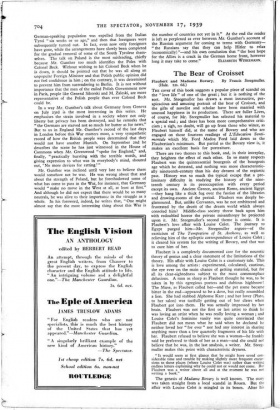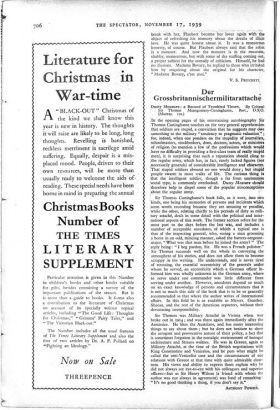The Bear of Croisset
Flaubert and Madame Bovary. By Francis Steegmuller.
(Hale. r25. 6d.) THE cover of this book suggests a popular piece of scandal on the " love life " of one of the great ; but it is nothing of the sort. Mr. Steegmuller has drawn a most instructive, per- spicacious and amusing portrait of the bear of Croisset, and the gifts of novelist and scholar have been married with unusual happiness in its production. There are fuller Lives, of course, for Mr. Steegmuller has selected his material to a special end ; and there has been more comprehensive criti- cism ; a sigh, no doubt, will go up from those who wince, as Flaubert himself did, at the name of Bovary and who are engaged on those fourteen readings of L'Education Senti- mentale which Mr. Ford Madox Ford laid down as the Flaubertian's minimum. But partial as the Bovary view is, it makes an excellent basis for portraiture.
There are two themes to this book, and, in their interplay, they heighten the effect of each other. In so many respects Flaubert was the quintessential bourgeois of the bourgeois age which he detested, and nothing was more characteristic- ally nineteenth-century than his day dreams of the orgiastic past. History was so much the typical escape that a pre- liminary difficulty in studying the history of the nine- teenth century is its preoccupation with every period except its own. Ancient Greece, ancient Rome, ancient Egypt —they hang like a thick fug over the fustian of the. libraries and drawing-rooms of the period. Flaubert was deeply be- glamoured. But, unlike Cervantes, was he not embittered and frustrated by the deceit of the dream world which always consoled him? Middle-class society threw back upon him with redoubled horror the private misanthropy he projected upon it. Mr. Steegmuller's second theme is comic. It is Flaubert's love affair with Louise Colet. The journey to Egypt purged him—Mr. Steegmuller argues—of the exoticism of The Temptation of St. Anthony, as well as relieving him of the epileptic correspondence of Louise Colet ; it cleared his system for the writing of Bovary, and that was to cure him of her.
Flaubert is a completely documented case for the neurotic theory of genius and a clear statement of the limitations of the theory. His affair with Louise Colet is a cautionary tale. This is love among the artists: experimental, calculated, cautious, the eye ever on the main chance of getting material, but for all its clear-sightedness subject to the most commonplace delusions. A man as sharp as Flaubert thought he was, to be taken in by this egregious poetess and dubious highbrow!
The Muse, as Flaubert called her—and the pet name became bitter in the end—appeared to be a dove, but really resembled a lion. She had stabbed Alphonse Karr ; and her lover (Plato, to her salon) was tactfully getting out of her claws when Flaubert got into them. He was actually impressed by her brain. Flaubert was not the first or last artist to think he was loving an artist when he was really loving a woman ; and Louise Colet's feminine vanity was quite convinced that Flaubert did not mean what he said when he declared he neither loved her " for ever " nor had any interest in sharing anything more than a few quarterly fragments of his life with her. Flaubert refused to believe she was a woman—he frankly said he preferred to think of her as a man—and she could not believe that he was, in the last analysis, a writer. Mr. Steeg- muller makes this point with characteristic dryness.
" It would seem at first glance that he might have saved con- siderable time and trouble by making slightly more frequent excur- sions to those places (where Louise Colet was) rather than writing endless letters explaining why he could not or would not come. But Flaubert was a writer above all and at the moment he was not writing a book."
The genesis of Madame Bovary is well known. The story was taken straight from a local scandal in Rouen. But the affair with Louise Colet is mingled in its bones. After his break with her, Flaubert became her lover again with the object of refreshing his memory about the details of illicit love. He was quite honest about it. It was a monstrous honesty, of course. But Flaubert always said that the artist is a monster. And now the monster is in the museum, shabby, momentous, but with some of the stuffing coming out, a proper subject for the comedy of criticism. Himself, he had no illusions. Madame Bovary, he replied to those who irritated him by enquiring about the original for his character, "Madame Bovary, c'est moi."
V. S. PRITCHETT.





































































 Previous page
Previous page